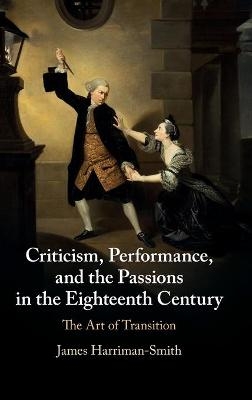
Criticism, Performance, and the Passions in the Eighteenth Century
The Art of Transition
Seiten
2021
Cambridge University Press (Verlag)
978-1-108-83549-7 (ISBN)
Cambridge University Press (Verlag)
978-1-108-83549-7 (ISBN)
Eighteenth-century theatre critics reserved their highest praise for the transitions of a play, recognising its most striking passages as moments of larger sequential transformation. Through a recovery of this perspective, scholars of theatre and literary culture gain renewed understanding of performance, the passions, and criticism in the 1700s.
Great art is about emotion. In the eighteenth century, and especially for the English stage, critics developed a sensitivity to both the passions of a performance and what they called the transitions between those passions. It was these pivotal transitions, scripted by authors and executed by actors, that could make King Lear beautiful, Hamlet terrifying, Archer hilarious and Zara electrifying. James Harriman-Smith recovers a lost way of appreciating theatre as a set of transitions that produce simultaneously iconic and dynamic spectacles; fascinating moments when anything seems possible. Offering fresh readings and interpretations of Shakespearean and eighteenth-century tragedy, historical acting theory and early character criticism, this volume demonstrates how a concern with transition binds drama to everything, from lyric poetry and Newtonian science, to fine art and sceptical enquiry into the nature of the self.
Great art is about emotion. In the eighteenth century, and especially for the English stage, critics developed a sensitivity to both the passions of a performance and what they called the transitions between those passions. It was these pivotal transitions, scripted by authors and executed by actors, that could make King Lear beautiful, Hamlet terrifying, Archer hilarious and Zara electrifying. James Harriman-Smith recovers a lost way of appreciating theatre as a set of transitions that produce simultaneously iconic and dynamic spectacles; fascinating moments when anything seems possible. Offering fresh readings and interpretations of Shakespearean and eighteenth-century tragedy, historical acting theory and early character criticism, this volume demonstrates how a concern with transition binds drama to everything, from lyric poetry and Newtonian science, to fine art and sceptical enquiry into the nature of the self.
James Harriman-Smith is a lecturer at Newcastle University. He is a trustee of the British Society for Eighteenth-Century Studies and a former trustee of the British Shakespeare Association. His articles have appeared in Theatre Journal, RECTR, Journal for Eighteenth-Century Studies, Studies in Romanticism, and Etudes françaises.
1. Dramatic Transition; 2. Zara; 3. Odes; 4. King Lear; 5. Dramatic Character.
| Erscheinungsdatum | 09.03.2021 |
|---|---|
| Zusatzinfo | Worked examples or Exercises |
| Verlagsort | Cambridge |
| Sprache | englisch |
| Maße | 158 x 235 mm |
| Gewicht | 500 g |
| Themenwelt | Kunst / Musik / Theater ► Theater / Ballett |
| Geisteswissenschaften ► Sprach- / Literaturwissenschaft ► Anglistik / Amerikanistik | |
| Geisteswissenschaften ► Sprach- / Literaturwissenschaft ► Literaturwissenschaft | |
| ISBN-10 | 1-108-83549-X / 110883549X |
| ISBN-13 | 978-1-108-83549-7 / 9781108835497 |
| Zustand | Neuware |
| Informationen gemäß Produktsicherheitsverordnung (GPSR) | |
| Haben Sie eine Frage zum Produkt? |
Mehr entdecken
aus dem Bereich
aus dem Bereich
Poetik eines sozialen Urteils
Buch | Hardcover (2023)
De Gruyter (Verlag)
59,95 €
Buch | Softcover (2024)
belleville (Verlag)
20,00 €


